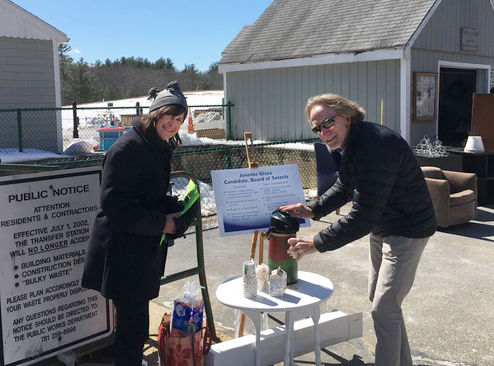 In the wake of some pushback against proposals to ban some uses of small water bottles and plastic grocery bags, one of the high school students behind the warrant articles wrote on Thursday that at least one of the issues will be withdrawn from a binding vote at Saturday’s Town Meting.
In the wake of some pushback against proposals to ban some uses of small water bottles and plastic grocery bags, one of the high school students behind the warrant articles wrote on Thursday that at least one of the issues will be withdrawn from a binding vote at Saturday’s Town Meting.
Students in the Lincoln-Sudbury Regional High School’s Environmental Club submitted two citizen’s petitions for Town Meeting in both Lincoln and Sudbury. One measure seeks to ban single-use plastic check-out bags at supermarkets and other retail stores. Thin-film plastic bags without handles that are used for meat, produce, newspapers, dry cleaning, etc., would not be affected.
The other measure would ban the retail sale of plastic single-use water bottles in town. Specifically targeted are polyethylene terephthalate (PET) bottles of 1 liter (34 ounces) or less containing non-carbonated, unflavored drinking water. Bottles could still be given away at any time or distributed in the event of a town-wide water emergency.
But some of the discussion on the town’s LincolnTalk email forum as well as letters to the editor of the Lincoln Squirrel took issue with the proposed bans for various reasons. Objections came from the owners of Donelan’s supermarket and two new restaurants in town, and residents on LincolnTalk urged more study and discussion of both issues before voting.
“We understand that although there are considerable environmental benefits to limiting plastic, there are also drawbacks when it comes to people’s convenience or to businesses that sell the non-reusable plastic bottles, making this subject controversial. For this reason, we are choosing to take a ‘sense of the town’ vote on the plastic bottle bylaw, and possibly also the bag bylaw, and revisit the issue at next year’s meeting in order to give voters a chance to [form] an informed opinion on the matter,” Lucy Bergeron, a junior at L-S, wrote in a post to LincolnTalk on behalf of the Environmental Club Thursday morning. “That said, we hope to get people thinking about this issue and begin the process of educating people.”
A “sense of the town” vote, which the Board of Selectmen had suggested earlier to the students, means that there will still be a presentation, discussion and vote on the warrant article, but the vote is non-binding and intended only to gauge where public opinion stands on the issue.

